#segregated discord areas
Note
honestly my best guess to why people are anxious regarding sending asks is that they see you as either a popular person or a scary/menacing one (thanks to the contents of this comic) and so, they get nervous about sending asks.
or something like that. i can't read minds i can only make guesses.

wild, sweet though
#not residuum#residual asks#why do people think residuum is popular#i promise you its not lol#but tbf i dont actually know how many followers residuum has#so maybe it is??? but idk i never see anyone talk about it outside of like#segregated discord areas#but im only in like one discord#residuum is just a niche part of the fandom i think
67 notes
·
View notes
Text
Dropout Discord Keeps on Giving
You'd think with the server shutting down / freezing in a week or so that there would not be anything to report, but you'd be wrong.
In the past few days the current batch of users, specifically that one young Jew who believes all of us are brainwashed, have been posting some out there stuff.
I have the screen shots but at this point it can be summarized as Everyone is Brainwashed but Me still thinks their family is brainwashed and they can't be honest with them about the Truth™ without being labeled a "traitor". But they know the Truth™ that this is a Genocide and the worst thing ever and their family doesn't (remember this is someone in their early 20s). Their family gave them Noa Tishby's book to read and its full of Zionist lies and propaganda. In response another use recommended this link.

Fig. 1. User responding to Everyone is Brainwashed but Me with a video to "argue" back with.
This video features Dr. Lara Sheehi. If you don't know who that is, Dr. Sheehi has a history of antisemitic behavior and targeting of Jews in her classes. Dr. Sheehi has openly supported Hamas and her social media was the infamous Blackflaghag that posted such wonderful things as "FUCK YOU AND FUCK YOUR AID". Profiles on Dr. Sheehi repeat the same thing that much of her time as a professor was spent demonizing Jews and Israel and trying to recruit people to BDS and other causes.
She was a professor at GWU and the university's investigation "cleared" her. However, the Office of Civil Rights opened an investigation into her and suddenly she left GWU in January 2024 and is now a professor at the Doha Institute for Graduate Studies in Qatar. Considering that Qatar has funneled billions of dollars into the USA collegiate system, was host to leaders of Hamas for years, and their state media acts as a mouth piece for Hamas, it's not surprising that she would end up there considering the amount of work she did for the Cause™ in the USA.
I doubt anyone will point out any of this to them, nor would they accept it as anything other than "Hasbara".
Later, they tell us that they finished the book and that it's full of apartheid denial and denial that Israel is a colonial state (there's a collage of pictures in between the two comments that I won't include here).

Fig. 2. Everyone is Brainwashed but Me mentions finishing the book.
The apartheid argument is one I have seen come up a multitude of times by activists, and it makes no sense to me. Apartheid, as defined, is the discriminatory authoritarian ruling of the majority by a minority population that results in segregation based on race within a country. As many have previously established, Arab Israelis have the same rights as all other non-Arab Israelis. They are part of the government, military, businesses, and so on. If the argument is to be made that there is apartheid like laws regarding Palestinians...well that makes no sense. The Palestinian territories are their own separate entity with their own separate governments, laws, and structures. Meaning, Palestinians entering Israel from Gaza or the WB are foreign nationals, they will of course be subject to different laws. In fact, every country has a set of laws for foreign nationals that differ in some capacity from the laws that govern their civilians. So we either have the Palestinian territories actually being a part of Israel in the mind of activists, which only area C could be considered this, or they're separate entities entirely. Area C gets into a whole realm of murky politicking that is outside of my realm of expertise, but it's the only place where I can see this argument hold any weight (and yes, the settlement stuff is bullshit and the military laws get into a whole weird realm of things, I'm well aware of this). However, I have yet to encounter any Western Activists acknowledging the complexity of Area C and the international laws and regulations regarding it, let alone the average activist even knowing the difference between the Areas, Israel, and Palestinian territories.
Now, I have seen the lack of a right of return for Palestinians be used as an argument that Israel is an apartheid state. And again, I have to ask how? This type of law is not characteristic of apartheid as we know and define it. But again, if we get into this territory then what happens? Do they become Israelis or are they Palestinian citizens? What laws are they subject to? If they're foreign nationals living in Israel due to a right of return then they have different laws that adhere to them, which is not part of an apartheid system. If they become Israeli citizens then they have all the rights given to them as citizens. Neither of these support the claim.
Simply put, they insist Israel is an apartheid state and when you mention any form of the above they call you a racist spreading propaganda and then shut down any meaningful discussion (in Dropout's case they kick you from the server for pointing out how wrong they are about things). We have a clear definition of what apartheid means and what practices are involved, but like "genocide" it seems that this definition has gone out the window and is now defined as anything people want it to be.
As for the colonial state argument, who is Israel a colony of? And don't say the USA or the UK, that would mean that they send resources back to those countries, are taxed by them, their government is controlled in every capacity by them, and so much more. Considering anti-Zionists like to say the USA's government is controlled by Israel, it's quite contradictory.
It appears that so much of the Western Activist's antisemitism anti-Zionism is couched within just believing everything Jews Israelis Zionists say is lies while openly believing a terrorist organization's narrative (an organization that I, once again, need remind everyone is on record saying they would manipulate Westerns into believing their narrative regardless of its veracity).
#jumblr#leftist antisemitism#dropout tv#academic antisemitism#It's awful to say but some professors may have nefarious ties that they don't want out in the open#But they do confirm them when they flee to a terrorist host and propaganda country#Activists keep using words they don't understand or refuse to accept the definition of#Just because you define a word a certain way does not make it the definition
29 notes
·
View notes
Text
Hello my dear faithful fourteen followers,
I’ve a request. Please accept. I am desperate.
The Blender is a Roleplay meant to take place in a universe where anything can happen, but there’s trouble in this impossible place. The world is separated by planets that collided thousands of years ago. However, they’re kept secret from each other through magical barriers. The different kinds of people sometimes escape into the other worlds, causing fairytales and panic. Can these worlds work out their differences? Or will the power imbalance be forever a segregating issue?
Worlds include
Human world (average modern human world)
Fairy World (includes Fae from a scale of human to tiny sized. Medieval times)
Giant World (humans live there in the form of borrowers to giants, unknowing of the actual human world. Medieval times and Modern times depending on which area it’s in)
Mermaid World (includes all shapes and sizes of sea people as well as human pirates. victorian era)
Spirit World (Size Shifting people are called spirits and originate from here. Futuristic technology)
#g/t#giant/tiny#original story#g/t writing#g/t roleplay#roleplay#ocs#Please join guys i need members#trust me y’all it’s fun#You can add all your ocs#Is really cool
33 notes
·
View notes
Text
In the late 1990s, when I was a New York Times correspondent based in West Africa, international airline connections made passing through Paris a rite of both work and vacation. On one such visit, I received a shock that has stuck with me. As I approached a subway station not far from the Champs-Élysées, out of its stairwell came running two policemen, their guns drawn, as they pursued a young Black man whom they caught up to, badly manhandled, and then hauled away under arrest.
As someone who had grown up in Washington, D.C., and recently moved to Africa from New York City—or simply as someone who had watched U.S. local news broadcasts and grown up consuming his country’s violent small- and large-screen offerings—I had been trained to think that urban scenes such as these were a unique product of my own country.
On subsequent transits through Paris, I was disabused of yet more of my naivete when I began taking trains into the central city instead of taxis. Maybe it was a labor strike that had caused me to do this at first, but the experience so intrigued me that I began making a habit of it. Not even in New York had I felt such a gulf between the popular image of a city and this kind of lived experience of it via public transportation.
For long sections of these rides, the cars were filled with Black and brown people–– overwhelmingly young and, I surmised, overwhelmingly either the children of recent immigrants or immigrants themselves, with France’s former colonies in North and sub-Saharan Africa the most likely places of origin. Before reaching the stylish, urban dreamland exalted in countless romantic Hollywood fantasies and more than a century of novels and travel writing, one must traverse something altogether different and discordant: a huge expanse of what the French rather delicately refer to as banlieues. They needn’t have resorted to the term, though. For many of these places, the old European word “ghetto” would have fit just fine.
Passing through and eventually visiting some of them, I was reminded of other grim cityscapes I have known in other parts of the world. The comparisons are admittedly not perfect, but segregated townships built under South African apartheid came to mind, as did some of the bleaker sections of New York where I had once paid dues as a local reporter, such as the more depressed parts of the Bronx.
As with the notorious infrastructure schemes of the powerful New York master planner of the last century, Robert Moses, which deliberately isolated Black communities and cut them off from areas privileged in terms of race and class and from public amenities such as the city’s beaches, Paris’s banlieues are poorly connected to the city��s transportation system, heightening their economic and social isolation and therefore their misery. For those looking for points of optimism after France’s recent civil disturbances, projects underway or on the books are expected to dramatically increase subway connections for these long-neglected parts of the city.
There is an old saw that holds that history never repeats itself but often rhymes. And it was just such a resonance—and not the recent events in Paris themselves, per se—that has brought France’s capital powerfully to mind for me.
To briefly review those events, though: On June 27, a French teenager of Algerian descent was fatally shot by a police officer during a traffic stop in what amounted to a virtual execution. A video of the incident that was widely shared online shows a police officer shoot 17-year-old Nahel Merzouk at close range through his window as his car pulls away.
Outraged young people, who were disproportionately “of color,” then rose up in protests that lasted for six days and included numerous acts of looting, vandalism, and even violence. This, in turn, drew florid condemnations from broad segments of French society, with many people using racialized language or outright racism to denounce not just the protesters’ behavior, but also the growing presence of minority groups in France and the immigration that helps drive it.
What has intrigued me here is a powerful coincidence of timing—and, as I will explore below, perhaps a deeper connection in terms of history and significance with a major decision by the U.S. Supreme Court. And therein, a paradox arises.
France has long prided itself on its all-but-unique handling of racial diversity. Official policy comes close to pretending that such a thing does not exist and takes this for an unqualified positive. The republic is indivisible, says one often invoked phrase, and in the pursuit of its supposed universalism, France has made it illegal to collect data on the basis of a person’s race.
If it is possible to glimpse some admirable idealism in France’s notion of universalism, it has an insufficiently acknowledged dark side as well. Firstly, it requires a near complete assimilation into the dominant national identity of we might call “Frenchness,” which is overwhelmingly defined and policed by people of one race. This might even be considered one of its main, if unstated, features. In order to function, French universalism requires a charade: pretending to be colorblind.
This colorblindness may help prevent French people from noticing that their television news industry or their cinema, to take two industries, are crushingly white, well beyond the true demographic breakdown of the society. But it does nothing to alleviate the underlying reality that opportunity still correlates strongly to race in the country. The same, for that matter, is true of life in the isolated banlieues, as opposed to the tonier parts of the city. I have little doubt that the same patterns hold in other spheres of society as well, from elite educational institutions to national politics.
France’s readiest and most powerful counterexample is, of course, the United States, which has long served as an almost archetypical national “other” to justify French policies and obtain buy-in from a French public that has been socialized over generations to view the United States both with haughty disdain and as a menace to the French way of life. Any idea of taking race or color into account in forming public policy is dismissed as succumbing to a dangerously corrupting Americanism.
The recent ruling by the U.S. Supreme Court that race-conscious college admissions programs violate the U.S. Constitution’s guarantee of equal protection, however, suggests the French may have little to worry about on this score. The two countries would indeed appear to be converging in favor of the French way: pretending that color doesn’t exist and that race has no place in social policy.
The Supreme Court ruling may have barred the overt consideration of race in college admissions in the United States, but it cannot pretend away the fact that Black students are dramatically underrepresented in higher education in the country, as they have been for generations—a product of actual policy during the United States’ long era of segregation and Jim Crow.
In fact, as the University of Chicago law professor Sonja B. Starr has argued, racial gaps exist across a very wide range of categories in U.S. life, from income and employment rates to maternal mortality and life expectancy to exposure to toxic environmental pollution and incarceration.
The question is: What are wealthy societies such as the United States and France to do about such realities? Overtly taking race into consideration clearly displeases large numbers of people in rich democracies, especially among those who have benefited most from inequality. If governments are not allowed to even weigh the racial facts before them, what realistic hope is there for public policy to redress these problems?
5 notes
·
View notes
Note
AO3 doesn't house 'every random thing' people submit. AO3 is a fannish-transformative work archive. Too many people think of AO3 as a sort of library when its more like a bank or vault for a specific purpose.
For specific content.
Fannish-transformative content. That could encompass RPF, meta, character-based fanfiction, universe-based original fiction, transcriptions, podfics, ect.
Does fannish-transformative content include a large scope? Yes. But its not AO3 is just shrugging its shoulders and saying yeah sure, whatever, post it here. I've literally had works removed because I added the alternative universe (fandom) the fic is based in as a fandom by mistake and not an additional tag, thus making it incorrectly a 'crossover' work.
I came across sort of harsh in my first message, for which I'm wholly apologising, but I'm exhausted and angered by two decades' worth of people looking at AO3 with biased tunnel vision.
AO3 is not a social site. AO3 is not a community site. AO3 is not like Wattpad or Tumblr. The literal purpose of AO3 is to archive content. We're frankly lucky it has the comment functions that it does. Think of AO3 like a massive harddrive, but online. Its Google Drive for fanfiction. That's it.
People have such an un-true perspective on AO3 that it causes constant harm. People demanding functions like private messages, group communities, more social aspects. Demanding censorship and certain community approaches and goals and restrictions.
It. Won't. Happen. Simply because that's not what AO3 is for. Its the same reason why there'll never be censorship, or 'safe spaces' or segregated areas on the site.
Its up to the users, specifically, to craft there work in a manner that telegraphs the intent. Use the tags. Use the author notes. Delete sexualising comments. My actual best advice? Create a Discord server where you can monitor the users accessing it. Craft your community there and use AO3 for what its intended for; hosting.
i've been on ao3 for almost nine years i know what it is. why has fandom culture normalized abuse porn.
like the problem isn't so much the specific rules of ao3 (i mean i disagree with the philosophy i guess but that's also a result of the culture) but with a culture that is actively hostile to traumatized and marginalized people. and don't try to tell me it isn't because there are countless firsthand accounts of how alienating and hostile and uncomfortable fandom can be.
when i wrote my first post i was thinking of a friend's fic, which features a disabled character. my friend got comments on their completely sfw fic assuming it was sexual. some people were mad at them for fetishizing disability and some were into it and both responses were wildly inappropriate for the story. why have we created a culture where it's more normal to sexualize and fetishize disability than to write about it? that culture is actively hostile to disabled people. as a disabled person who frequently writes about disability this makes me feel unsafe. deleting the comments still means you have to read and see them and know that this is how your work is being interpreted. and you can telegraph your intent all you want but that won't give readers critical thinking skills!! like!! sorry don't blame the writer of a sfw fic for the people who automatically sexualize everything.
i also like... never asked for messaging or any other social media feature. yes i'm thrilled to be able to block users but i never asked for that either. but like ao3 does serve a social purpose no matter how much it pretends it doesn't? like? yeah it's an ~archive~ but its main practical use right now is not historical. you can already leave comments on works that go directly to the author-- compared to other sites framing the feedback function as reviews. that has been true as long as ao3 has existed. i don't want it to be a social media and in fact i wish it were less of one.
it is also truly bold of you to assume that i don't already curate my experience. i have my own small communities. i literally do have a discord server and we have an ao3 collection just for our works. i have a fic blog for the express purpose of hosting my fics somewhere that isn't ao3. i have been in fandom for ten years now. and i can understand the purpose and function of ao3 and still disagree with it. you're coming off as really condescending here.
4 notes
·
View notes
Text
Follow These 8 Basic Rules for Designing

Follow These 8 Basic Rules for Designing
In the first place, we must define the definition of word “good design”. Therefore, there are two crucial elements. It needs to draw attention and also catch the eyes of the viewer and serve to serve a function (that is, convey an idea). Today, design software for free can be downloaded from the internet however to make an effective design, to make a career as a professional graphic or product designer, it is important to understand the guidelines that every designer must follow when making his designs.
To help you improve your design skills we have compiled 8 basic rules for good graphic design.
1. KISS
KISS is now an established design principle that graphic artists have been applying to their graphic design ever since. Keep it simple, stupid is a catchy phrase invented by Kelly Johnson, lead engineer at the Lockheed Skunk Works, in 1960. The meaning of the principle is easy to comprehend and closely resembles “less is more”. Don’t overcomplicate your design, keep it simple.
The top Industrial designers in India thinks that a straightforward layout is more attention-grabbing for the viewers. With limited attention spans and the overwhelming amount of information available it is essential to make sure you convey your message. In this regard check your layout and remove all unnecessary elements. For instance the use of greater than 3 colors plus more than three fonts or design elements that don’t convey any information or split a lengthy word into multiple paragraphs. Each design element must fulfill a specific purpose. Consider if you require this element to fully comprehend the concept.
In addition, we will then look at the following set of rules that will provide more information on how and why simplicity is crucial.
2. White Space
The primary element in good style is the white space sometimes referred to as negative space. The white space refers to the area between elements of your design. Space that isn’t filled with text, graphics, or photographs. White space does not have to be pure white.
It can be a texture or colored background insofar as it doesn’t contain elements of design or other content. Nearly every designer has to deal with the same issue: discord with the client over white space.
While designers from the best product design companies in India are aware of the advantages of using negative space in a layout, clients often feel the design isn’t worth what he has paid for. For the designer white space means lost space. White space is seen by designers as the standard for good graphic design.
The majority of clients require that each space is filled with details and components. It is difficult to read, and not enough focus is given to the important things, and overcrowded images usually result in messages not reaching the right people. Make sure to avoid this scenario. Consider creating paragraphs and segregating text by subheadings and headings to improve the comprehension of the information and make it to scan.
It is suggested that once you have received the request from the client, you spend some time considering what details must be included and what message it is crucial to convey. Let one element of your graphic design be distinct from others. This is the focus, and in order to make it clear to the viewer, it must be separated from different objects by negative space. Explore the finest Graphic Design Studios In Bangalore too.
3. Rule Of Thirds
Utilizing a grid for your layout, break it into three equally-sized horizontal sections, and three equally-sized vertical sections. The resulting grid acts as a “roadmap” that helps you determine the best place to put the elements of design. The result will be nine fields. The places where the lines meet define the primary focal points in your design. Moving an element closer to the intersection will enable its design to pop and objects further away will not receive as much notice.
People tend to adhere to a large “F” shaped pattern with their eyes every time they look at a drawing. The eyes naturally begin with the top left portion of the canvas, and then shift to the bottom left then back towards the upper right, and then down to the middle. Get to know more about Graphic Design Studios in Bangalore as well.
Rule of Thirds is one of the most effective graphic designing tools for figuring out the best way to utilize balanced asymmetry in your favor. When your style is unbalanced it can throw off the overall appearance. A Rule of Thirds grid can help to maintain a good balance and still keep things symmetrical. See the top Industrial design companies.
4. Golden Ratio
The golden ratio is the mathematical formula used to create proportions from the natural world. These proportions are thought of as pleasing to the eyes and create balance since they are everywhere around us, including within our own bodies.
The division of the geometrical components into ratios that are 1:1,618. Create a grid using your design software based around the golden proportion. The grid we create is created using Adobe Illustrator, and we employ it frequently when designing imaginative logos, designs or any other visual content.
Utilize this rule to create balance by determining the appropriate proportions. Check out the best service provider for Design Studios in Bangalore as well.
5. Hierarchy
Visual Hierarchy is the way of placing elements of design in order of importance. It’s an established set of rules which determine the way in which we observe the things we notice. The most frequent eye movement pattern that readers use can be described as that of the F pattern. It’s because that’s the way we read a book as well as a letter or web page.
The leading Product Design Companies in India states that we read the page starting from the left across the top, and then for each text line until we are at the end of the webpage. Because of this normal pattern, designers typically employ an F pattern when designing websites, or other illustrations that are heavily based on text. Reading in a different direction can be uncomfortable, especially when it’s different from what we’re used.
Designers can highlight certain aspects of a design by placing them alongside the common “Z” eye-movement patterns. Consider an image, a heading, or a subheading. Find out the about the Top Industrial Design Companies.
Hierarchy is an endless topic. The hierarchy can be used in a variety of ways, however, we will concentrate on some to help us understand the basic principles of the system. The first is size. It is the most effective method to highlight visually appealing elements.
6. Contrast
The method you display certain elements of your design acts as the function of a guide. Yes, you can direct your viewers. Visual hierarchy is made by contrast. Contrast helps the user figure clear what is the most significant element or information within your design, and what is in third place, the list goes on. However, remember that contrast isn’t the same as conflict.
The dramatic contrast of colors can draw attention to specific elements rather than smaller scales. For instance, putting the red object on the backdrop of black or green will attract more attention than a similar red object placed against the background of purple or orange. Find out about the amazing Graphic Design Studios in Bangalore as well.
The colors employed in a design are known as the color scheme. The designer’s colors can bring about harmony, harmony in rhythm, harmony, and balance in the creation. However, it is also able to bring out contrast and emphasis.
The human eye detects colder than warm shades. Thus, color choices will affect the viewer’s ability to distinguish a person in the design. Combining cool and warm shades can result in depth similar to perspective.
7. Creative Fonts
When it comes to the use of creative fonts, we must be aware. They are suitable as headlines, but not in the text that is the primary one. They are more difficult to read, and they should not be used in body text. The excellent service provider of Design Studios in Bangalore obeys the general rule, that if you’ve got more than three pages of text do not make use of a script or creative font.
Classic fonts have a long-lasting appeal. They were developed during the 19th century and 18th, and are still in use. We are using them all the time. The human eye is trained to detect them right away. Be sure to use no more than 3 fonts in your layout. Every time you feel you require to create a new font, you can play with different sizes of fonts for the fonts you already have.
8. Scale Proportionally
When you decide to resize your image make sure you do it proportionally. Many novices make a mistake when they stretch their images to make them more suitable. Sometimes, the proportions of your image don’t meet the standards so you need to cut your photo down to the correct size. CMYK mode is designed for printing and the web, it is recommended to choose RGB mode. RGB mode. It is recommended to use the resolution of 250 dots in the final output format to print. 3oo dpi is a good resolution However, most of the time we don’t come across top-quality images. Learn about the fantastic Graphic Design Studios in Bangalore.
#top industrial designers in india#design studios in bangalore#product design companies in india#top industrial design companies#graphic design studios in bangalore
0 notes
Text
Rachel Maddow did a great piece yesterday, on how racist civic engineering contributed to the community in Buffalo being segregated and cut off from grocery stores, effectively turning it into a food desert (I’ve spoken about these before—urban areas that are largely poor which have zero access to food). The community was originally designed to have a park system that was connected by tree-lined walkways. The parkway was bulldozed to make way for an expressway, removing the park and dumping pollution for the sake of white commuters. The grocery store that was chosen—Tops— was the only store in that community, put there after a long struggle to get a store in that area, and was chosen by the white supremacist mass shooter as a target, in order to kill as many black people as possible. Another target? A middle school, because he wrongly and prejudicially believed that the school in question would have a higher concentration of black students because in his mind, they wouldn’t test as well, and so would be in the public system of the area.
Everything is connected. It never ceases to amaze me that racists continue to create these situations and then use them as the proof and justification for their superiority. You can’t hobble a man, beat him at a game, murder anyone who opts out, and then say “I won because I’m superior”. That makes you a prick, not an example of perfection.
Social media indoctrinated him. He posted on 4-Chan, was in racist discord servers, and streamed to twitch. He turned those racist collaborators into strong actors in his life. He mainlined conservative talking points. Social media matters, so be selective in your media and by god keep track of your children.
43 notes
·
View notes
Text
Martin Luther King Junior’s “I Have a Dream” speech (printed below) is usually summed up as a statement sweet, pacifist faith in a future when race will not matter. However, when reading it, one finds expression of faith, yes, but also of the frustration of centuries of brutal injustice and “of the fierce urgency of now.” Yes, that urgent now he referred to was almost 60 years ago, but The Reverend King also was referring to the urgent now we are living today.
Rev. Dr. Martin Luther King, Jr., delivered this iconic ‘I Have a Dream’ speech at the March on Washington on August 28, 1963. See entire text of King’s speech below. (Source: NAACP.org)
I Have a Dream
I am happy to join with you today in what will go down in history as the greatest demonstration for freedom in the history of our nation.
Five score years ago, a great American, in whose symbolic shadow we stand today, signed the Emancipation Proclamation. This momentous decree came as a great beacon light of hope to millions of Negro slaves who had been seared in the flames of withering injustice. It came as a joyous daybreak to end the long night of their captivity.
But one hundred years later, the Negro still is not free; one hundred years later, the life of the Negro is still sadly crippled by the manacles of segregation and the chains of discrimination; one hundred years later, the Negro lives on a lonely island of poverty in the midst of a vast ocean of material prosperity; one hundred years later, the Negro is still languished in the corners of American society and finds himself in exile in his own land.
So we’ve come here today to dramatize a shameful condition. In a sense we’ve come to our nation’s capital to cash a check. When the architects of our republic wrote the magnificent words of the Constitution and the Declaration of Independence, they were signing a promissory note to which every American was to fall heir. This note was the promise that all men, yes, black men as well as white men, would be guaranteed the unalienable rights of life, liberty, and the pursuit of happiness.
It is obvious today that America has defaulted on this promissory note in so far as her citizens of color are concerned. Instead of honoring this sacred obligation, America has given the Negro people a bad check, a check which has come back marked “insufficient funds.”
But we refuse to believe that the bank of justice is bankrupt. We refuse to believe that there are insufficient funds in the great vaults of opportunity of this nation. And so we have come to cash this check, a check that will give us upon demand the riches of freedom and the security of justice.
We have also come to this hallowed spot to remind America of the fierce urgency of now.
This is no time to engage in the luxury of cooling off or to take the tranquilizing drug of gradualism.
Now is the time to make real the promises of democracy; now is the time to rise from the dark and desolate valley of segregation to the sunlit path of racial justice; now is the time to lift our nation from the quicksands of racial injustice to the solid rock of brotherhood; now is the time to make justice a reality for all of God’s children.
It would be fatal for the nation to overlook the urgency of the moment.
This sweltering summer of the Negro’s legitimate discontent will not pass until there is an invigorating autumn of freedom and equality. Nineteen sixty-three is not an end, but a beginning. And those who hope that the Negro needed to blow off steam and will now be content, will have a rude awakening if the nation returns to business as usual. There will be neither rest nor tranquility in America until the Negro is granted his citizenship rights. The whirlwinds of revolt will continue to shake the foundations of our nation until the bright day of justice emerges.
But there is something that I must say to my people, who stand on the worn threshold which leads into the palace of justice. In the process of gaining our rightful place, we must not be guilty of wrongful deeds. Let us not seek to satisfy our thirst for freedom by drinking from the cup of bitterness and hatred.
We must forever conduct our struggle on the high plane of dignity and discipline. We must not allow our creative protests to degenerate into physical violence. Again and again we must rise to the majestic heights of meeting physical force with soul force. The marvelous new militancy, which has engulfed the Negro community, must not lead us to a distrust of all white people. For many of our white brothers, as evidenced by their presence here today, have come to realize that their destiny is tied up with our destiny. And they have come to realize that their freedom is inextricably bound to our freedom.
We cannot walk alone. And as we walk, we must make the pledge that we shall always march ahead. We cannot turn back.
There are those who are asking the devotees of Civil Rights, “When will you be satisfied?”
We can never be satisfied as long as the Negro is the victim of the unspeakable horrors of police brutality; we can never be satisfied as long as our bodies, heavy with the fatigue of travel, cannot gain lodging in the motels of the highways and the hotels of the cities; we cannot be satisfied as long as the Negro’s basic mobility is from a smaller ghetto to a larger one; we can never be satisfied as long as our children are stripped of their selfhood and robbed of their dignity by signs stating “For Whites Only”; we cannot be satisfied as long as the Negro in Mississippi cannot vote, and the Negro in New York believes he has nothing for which to vote.
No! no, we are not satisfied, and we will not be satisfied until “justice rolls down like waters and righteousness like a mighty stream.”
I am not unmindful that some of you have come here out of great trials and tribulations. Some of you have come fresh from narrow jail cells. Some of you have come from areas where your quest for freedom left you battered by the storms of persecution and staggered by the winds of police brutality.
You have been the veterans of creative suffering.
Continue to work with the faith that unearned suffering is redemptive.
Go back to Mississippi. Go back to Alabama. Go back to South Carolina. Go back to Georgia. Go back to Louisiana. Go back to the slums and ghettos of our Northern cities, knowing that somehow this situation can and will be changed. Let us not wallow in the valley of despair.
I say to you today, my friends, so even though we face the difficulties of today and tomorrow, I still have a dream.
It is a dream deeply rooted in the American dream.
I have a dream that one day this nation will rise up and live out the true meaning of its creed, “We hold these truths to be self-evident, that all men are created equal.”
I have a dream that one day on the red hills of Georgia, sons of former slaves and the sons of former slaveowners will be able to sit down together at the table of brotherhood.
I have a dream that one day even the state of Mississippi, a state sweltering with the heat of injustice, sweltering with the heat of oppression, will be transformed into an oasis of freedom and justice.
I have a dream that my four little children will one day live in a nation where they will not be judged by the color of their skin but by the content of their character.
I have a dream today!
I have a dream that one day down in Alabama — with its vicious racists, with its Governor having his lips dripping with the words of interposition and nullification — one day right there in Alabama, little black boys and black girls will be able to join hands with little white boys and white girls as sisters and brothers.
I have a dream today!
I have a dream that one day every valley shall be exalted, and every hill and mountain shall be made low. The rough places will be plain and the crooked places will be made straight, “and the glory of the Lord shall be revealed, and all flesh shall see it together.”
This is our hope. This is the faith that I go back to the South with. With this faith we will be able to hew out of the mountain of despair a stone of hope.
With this faith we will be able to transform the jangling discords of our nation into a beautiful symphony of brother-hood. With this faith we will be able to work together, to pray together, to struggle together, to go to jail together, to stand up for freedom together, knowing that we will be free one day.
And this will be the day.
This will be the day when all of God’s children will be able to sing with new meaning, “My country ’tis of thee, sweet land of liberty, of thee I sing. Land where my father died, land of the pilgrim’s pride, from every mountainside, let freedom ring.” And if America is to be a great nation, this must become true.
So let freedom ring from the prodigious hilltops of New Hampshire; let freedom ring from the mighty mountains of New York; let freedom ring from the heightening Alleghenies of Pennsylvania; let freedom ring from the snow-capped Rockies of Colorado; let freedom ring from the curvaceous slopes of California.
But not only that.
Let freedom ring from Stone Mountain of Georgia; let freedom ring from Lookout Mountain of Tennessee; let freedom ring from every hill and mole hill of Mississippi. “From every mountainside, let freedom ring.”
And when this happens, and when we allow freedom to ring, when we let it ring from every village and every hamlet, from every state and every city, we will be able to speed up that day when all of God’s children, black men and white men, Jews and Gentiles, Protestants and Catholics, will be able to join hands and sing in the words of the old Negro spiritual:
“Free at last. Free at last. Thank God Almighty, we are free at last.”
404 notes
·
View notes
Photo

(光与夜之恋 Light and Night) Osborn’s 5✩ Inspiration: Congealing Azure Light [碧珀凝光] Date Translation (Prologue)
“Oh? ‘Ah Qiang’? So you're not going with me to the movies tomorrow because you've already made plans with him?”
*Light and Night Master-list | Osborn’s Personal Masterlist
*Spoiler free: Translations will remain under cut
*Join the Light & Night Discord (^▽^)~ ♪
*This 5✩ Inspiration has 5 Endings!!
*Osborn’s tag will be #For Night, For Freedom
*Requested by anon! You can check my on-going requests and more here!
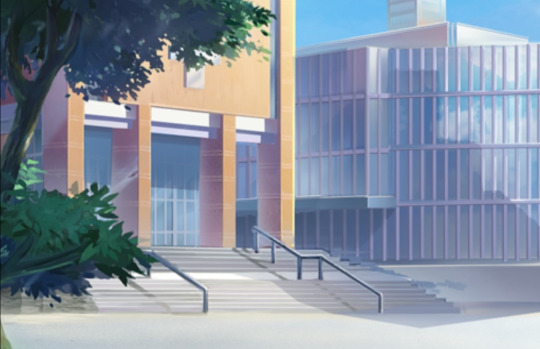
On a bright sunny morning one day, our car was parked before a half run-down courtyard.
Osborn looked out the window, raising his eyebrows in slight surprise as he read the words on the signboard.
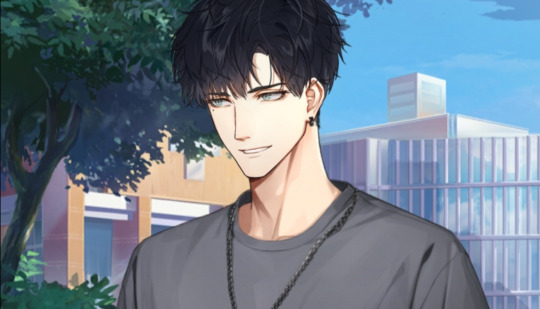
Osborn: An orphanage? This is where you're meeting Ah Qiang?
MC: Yup.
The metal door of the orphanage slowly swung open as soon as I got out of the car, a small head peeking out.
It belonged to a little boy who looked to be around 10-years old. Upon catching sight of me, he became akin to a bird who was leaving its nest. He zipped towards me with both arms held wide open and an elated look on his face.
Ah Qiang: Big sis! You're here!

MC: Hello, Ah Qiang! You've grown taller again.
Osborn looked him up and down, his face turning red in embarrassment before it cooled back to his usual pale but healthy pallor. How interesting.
Osborn: And he's Ah Qiang?
MC: Haha, why do you look so disappointed?
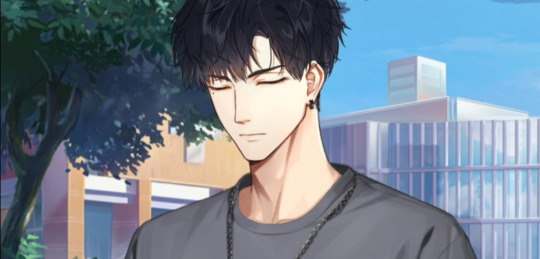
Osborn: ……
❖☆———————————★❖
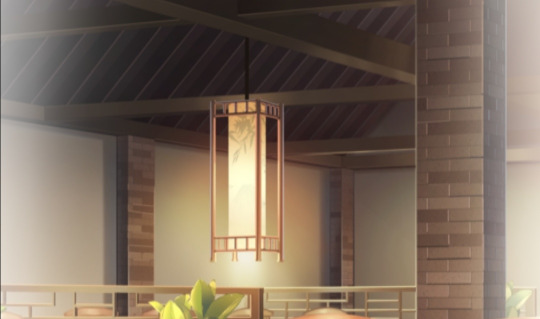
Recently, I’d participated in a charity project where I’d regularly visit a community orphanage to see the children there. Ah Qiang was one of the orphanage kids that I’d met.
In the blink of an eye, it was soon time for me to pay my routine visit to the orphanage. I had suddenly received a call from him yesterday while I was eating with Osborn.
He’d called in place of the orphanage staff, asking if I’d be visiting them tomorrow.
MC: Hello, Ah Qiang~? Of course, I'll go see you tomorrow. There's no way I'll forget.
He even told me that there’d be lots of interesting activities in the orphanage tomorrow waiting for me and hoped that I’d come earlier. Afterwards, he told me that all the kids there were looking forward to my upcoming visit.

MC: That excited? Okay, I'll come earlier then.
MC: I can't wait to meet you too. Yeah, see you tomorrow!
The child’s bright and jubilant voice was comforting in its own way. After cutting the call, Osborn became suspicious of how I was now all smiles.
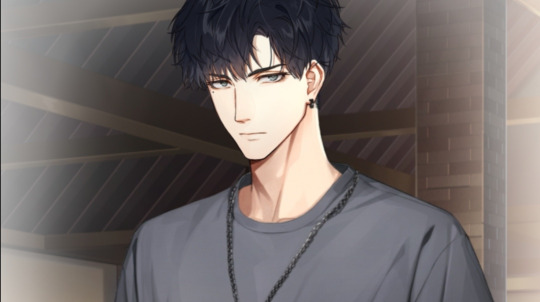
Osborn: Oh? "Ah Qiang"?
Osborn: So you're not going with me to the movies tomorrow because you've already made plans with him?
Seeing him scrunch his eyebrows together like that made me want to tease him for a bit. He looked disgruntled, and also a little saddened by it.

MC: Yeah, we made plans a long time ago.
Just as expected, the crease between his brows only grew deeper at the revelation.
Osborn: Hu? Just what sort of plans have you made with him that's gotten you this eager?
MC: Why don't you come with me if you're so curious?
Osborn: I'll take you up for it then.
❖☆———————————★❖
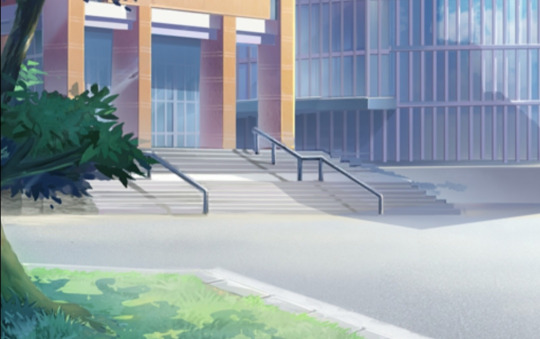
Osborn breathed a sigh of relief after learning of the truth before hooking me around the head in retaliation.
Osborn: You’ve learnt how to keep people on tenterhooks now, hu?
MC: Would you have been curious if I'd told you everything right off the bat?
Osborn: Next time, you can just tell me that you want me to accompany you.
We talked and laughed all the way to the entrance of the orphanage with Ah Qiang leading the way. The orphanage was built like any old school out there that was on a smaller scale. Short buildings were looming behind the vast, clean, concrete flooring, with a long and narrow flower pond serving as a divider, segregating the open space into two different areas.
Hearing the commotion of our entrance, a group of plainly dressed but cheerful children rushed out of the building, instantly surrounding us.
Looking at these familiar faces made a sense of nostalgia well up in me. I faced them and greeted them all in turn.

MC: Xiaoqiu, you've braided your hair really beautifully.
Xiaoqiu: I did it myself!
MC: Really? You're so awesome!
Ah Zhen: Do you think my clothes are nice, big sis?

MC: Why are you wearing a black cloak?
The little girl fixed her hood with a proud look, attempting to look mysterious.
Ah Zhen: ‘Cause I’m a witch!

MC: Oooh! Then I guess that makes you the cutest little witch!
The kids wavered their hands around, clamouring as they fought for the chance to talk to me. Osborn watched in interest from the side for a while before leaning over to my ear.
Osborn: Never knew you liked kids this much.
MC: When I first saw them, I realized just how simple it is to fulfil their happiness.
MC: They’re all kids who were once unloved, but they’re all so easily satisfied.
MC: I couldn’t help but sympathize and shower them with more love and care.
MC: And the children are so cute!
MC: Their world is always simple and filled with fun. It makes people unknowingly feel relaxed and at ease being around them.
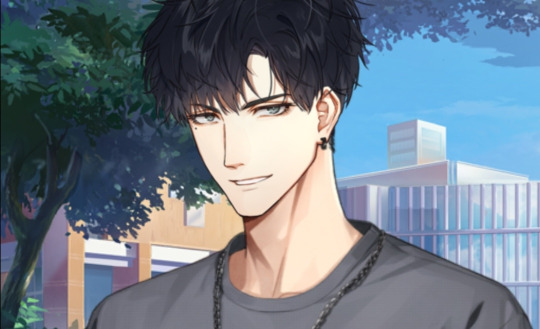
Osborn: That's true.
I had a short whispered exchange with Osborn. By the time my attention came back to my surroundings, I noticed that all the kids had their attention on Osborn. They stared at him with big, bright, doe-like eyes.
Xiaoqiu: Hey, big sis? Who is this big brother? He looks really handsome!
Ah Zhen: I’m a witch, so lemme guess! Hmm… He must be big sis’ boyfriend!
Feeling my cheeks burn, I quickly waved my hand to dissuade them.

MC: No, no! This is brother Osborn. He’s here today to play with all of you.
People with good looks are welcome everywhere they go, and this place was no exception. The kids clapped their hands and cheered. A few of the bolder ones even stepped up to tug at his clothes.
Xiaoqiu: Big brother, big sis knows how to make pretty clothes; what about you?
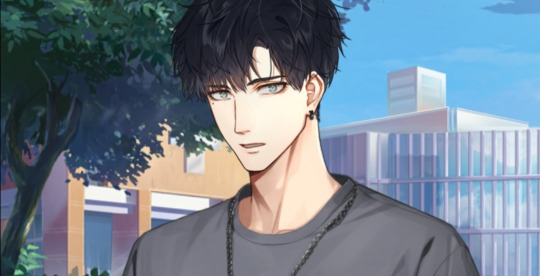
Osborn: Err… Does driving count?
Ah Zhen: Do you know how to play chinese checkers, big brother? Let’s play a round!
Osborn: Chinese checkers? It's been a long time since I last played that…
Osborn was especially popular with the girls. The voices of the girls rang out crisply in the air as they shot him one question after another, sounding just like a small group of chirping sparrows.
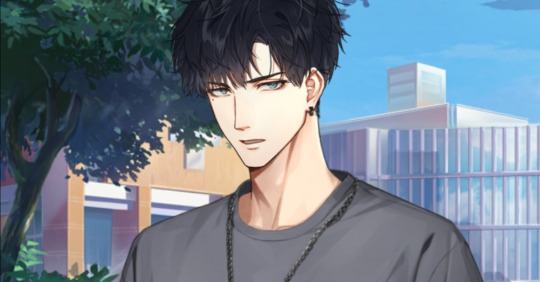
Osborn awkwardly turned around within the circle of children he was being surrounded by, his face growing redder and redder. Suddenly, an interesting thought struck me…
Maybe… He wasn’t good at dealing with children?
I was inwardly excited at the prospect that that might be the case. I stopped trying to speak for him, stifling a smile as I watched the drama unfold before my eyes from a safe little corner.
Xiaodie: Big bro, do you know how to comb a doll’s hair? My doll’s hair can’t be combed...
Xiaoyue: I wanna be lifted high, big bro! Take me to the skies!
Xiaojing: Do you play the guitar, big brother? Xiaojing thinks that guys who play the guitar are the most handsome!
Osborn’s smile froze and became increasingly stiffer on his face. He shot me a pleading look for help, but I shrugged it off with a smirk.
MC: Why are you looking at me? The little girl's asking you.
He narrowed his eyes in mute warning. Finally, he gave up and tugged at a handful of his hair in frustration.
Osborn: Ahem. Actually, I'm just this young lady's bodyguard. If you have anything to ask, then please ask her instead.
Xiaoyue: Whoa, a bodyguard!
Xiaojing: I don't believe you! There's no way a bodyguard would look this handsome!
Xiaoqiu: What does bodyguard mean?
Ah Zhen: The witch knows! A bodyguard protects their owner joined at the hip!
Xiaoqiu: And… what does "joined at the hip" mean?
Ah Zhen: Uhm, they eat, sleep, and go to the toilet together!
Several girls looked at me and Osborn in sheer disbelief. Some even covered their eyes.
Xiaodie: Hu? How can they do that… That's so embarrassing…
I was embarrassed beyond belief and wanted nothing more than to disappear on the spot. Osborn only laughed. He didn’t seem like he was going to clear this up at all.
It was then that I caught sight of a couple of kids in the distance. They were headed into the building with all sorts of little equipment in hand. Seeing the chance, I quickly changed the subject.

MC: It's nothing like what all of you are thinking… By the way, what are they doing?
Ah Qiang, who had been left, raised his little hand in response.
Ah Qiang: It's creation day!
MC: Creation day?
Ah Qiang: Yeah! Today's the day where the orphanage was built.
Ah Qiang: It's a day where everyone makes cute stuff and gives them to the person they really, really, like!
Ah Qiang: The students in the other classes have already started. We can go to the kitchen, the art room, or the vegetable garden to do it...
Ah Qiang: Where do you wanna go, big sister? Let’s go together!
I looked towards Osborn. He jerked his chin towards me, gesturing that I could just decide for us both.

MC: Hmm, let me think…
Where should we start this creative journey of ours…?
⊹ ˚✩ ━━━━━━━━━━━ ∘◦ ✥ ◦∘ ━━━━━━━━━━━ ✩˚ ⊹
✥ Choose your Ending:

END 1 | Choice: Do Nothing [都不做]
END 2 + 3 | Choice: Approach [亲近] ⊹Touch⊹
END 4 | Choice: Listen [倾听] ❖ASMR
END 5 | Choice: Heart-throb [心动] ★Night★
❖☆————— ⊹ For Night, For Freedom⊹ —————★❖
#光与夜之恋#Light and Night#Otome#Translations#Tencent#萧逸#Osborn#For Night For Freedom#碧珀凝光#Congealing Azure Light
28 notes
·
View notes
Text
cultural fashion thoughts
Domino
roman-inspired. flowing, drapey fabrics that are either tied or pinned into shape
fabrics are usually either undyed or pale pastel, but aggressively accented with bright colors and strong textures with trim, cording, and jewelry
women’s clothing is accessorized primarily with flowers and decorative cording, and wealthy women especially can have an entire garden on a single dress. voluminous gibson girl updos are en vogue, usually with more flowers piled on top, always with 1-4 loose locks to frame the face or neck
men’s accessories of choice are feathers, greenery, and pins/brooches, and their clothes tend to be draped more asymmetrically than women’s. hair is short and neat on both head and face, to better show off elaborate earrings, and occasionally facial jewelry
a longer beard decorated with flowers or tightly tied hair decorated with feathers are typical indicators of gender nonconformity
at the time of the fall the most popular jewelry trends were statement rings in the shape of filigree flowers for women, and metal chokers in the shape of ferns for men
Melody
long years of political discord mean massively varying regional fashions, but in Musa’s area rich colors and intricate prints (for the poor) and embroidery/brocade (for the rich) are the style
the focus is on the fabric, with stiff materials and broad, flat cuts to show off the details. scenery and nature motifs are more traditional, and abstract patterns or gestural images are more popular with young people. accessories are usually practical or faux-practical, such as bags, pouches, books, spectacles, and parasols, and long hair is popular for both men and women
broad-legged pants and high collars are trendy for women, with panels of fabric often laced together with cording to allow them to move without bending and give a peek of skin. long, straight, silky hair is everything, held back from the face but minimally decorated, usually with a single comb. lights and lanterns are a popular motif
men’s trousers are usually softer fabric and narrower cut, with the focus on a tunic or jacket instead. sleeves are sometimes sewn with pre-determined crease lines to preserve their structure, and the breast is usually left slightly open. men’s hair is also kept long and silky, but tied back more securely with ribbons or pins
Solaria
Solarian fashion has exploded since Stella became a public figure, so there’s a stark before and after difference
more traditional clothing is typically minimal, either baring a lot of skin or wearing only the thinnest silks (or both) with glass and polished wood for accents. a wide, elaborate collar or necklace is The accessory, and veils and delicate headscarves are common, particularly when decorated with beads and metallic thread. a suite of earrings is also a must
post-Stella fashion incorporates heavier fabrics and ornamentation, voluminous skirts, and more artificial colors and textures, as well as asymmetry. there’s also greater variety in general, and her signature bangs became the definitive style for young women
male and female styles are very fluid, the distinctions usually being subtle or seasonal, but bracelets, armbands, and rings are more popular for men, where women lean more toward jeweled belts, waist drapes, and anklets
Andros
there’s very little overlap between Royal Fashion and Normal Fashion
royal clothing has been basically unchanged for several decades, with strong but conservative earth and sea tones, metallic accents in silver, never gold, and highly structured garments such as stays. massive sleeves, layered fabrics, and floor-length skirts are the order for women, and wide cuffs, collars, and very high boots for men
men wear rings on the left, women on the right, ears are pierced once regardless of gender and no more, hair is kept long for both sexes but girls wear theirs loose until the age of majority and then adopt one of a few elaborate, restrained styles. boys hair is put in locs early and kept that way through adulthood
non-royals have more relaxed gender roles and much more relaxed fashion. wrapped skirts, playful fringe, sunset colors, and starfish or turtle shells are popular across the board. men do usually wear locs, but not always, and they can be accessorized, and women style their hair with incredible detail. women’s tops are usually sleeveless and men usually wear open vests
Linphea
all natural all the time. no artificial materials ever. softened tree fibers, leather, and hemp are the standard, though very little children usually wear woven grass or nothing at all. intricately carved wood and polished amber are popular, and feather earrings, and going topless is normalized
women usually wear loose, jewel-toned skirts, and wraps, vests, and triangle tops, if they wear tops at all. armbands are classic and shawls are trendy, and dyed fingertips are becoming a style (linpheans naturally have green or darker brown tinged hands) especially in purple
boys often wear skirts, but adult men wear loose pants in shades of brown and green, always with a patterned print, sometimes with decorative draping or wrapping. they incorporate brighter colors in accessories, especially red necklaces, and carmine eyeshadow is starting to become popular as well
linpheans do wear styles inspired by other planets, but they almost never import clothing (out of objection to Artificial Materials) and since they’re making all their own shit anyway it’s just easier to make garments they already know how to make
Zenith
Almost no gender segregated fashion at all, although minimalist ankle-length skirts are having a moment with men, and geometric-print harem pants are picking up steam with other genders
whites, greys, and other neutrals accented with metals and neons are the current mood, especially magenta and cyan, and LED accessories are everything. hair is usually short or part-shaved, and an asymmetrical shave trimmed in an abstract pattern is especially fashionable. maximalism and minimalism play off eachother, with zippers, belts, decorative seams, and a variety of fabrics all in one jacket over a plain white shirt being THE look
silhouettes are either athleisure wear or focused on the clothes rather than the body. for some zenethes baggy clothing is representative of privacy, a la billie eilish, and layers are common regardless because it’s chilly year round
zenith haut couture is starting to take a turn toward skimpier, less practical clothing, playing with transparency and 3D structures, but those styles haven’t trickled down into the genpop yet
109 notes
·
View notes
Audio
I am happy to join with you today in what will go down in history as the greatest demonstration for freedom in the history of our nation.
Five score years ago, a great American, in whose symbolic shadow we stand today, signed the Emancipation Proclamation. This momentous decree came as a great beacon light of hope to millions of Negro slaves who had been seared in the flames of withering injustice. It came as a joyous daybreak to end the long night of their captivity.
But one hundred years later, the Negro still is not free. One hundred years later, the life of the Negro is still sadly crippled by the manacles of segregation and the chains of discrimination. One hundred years later, the Negro lives on a lonely island of poverty in the midst of a vast ocean of material prosperity. One hundred years later, the Negro is still languished in the corners of American society and finds himself an exile in his own land. And so we've come here today to dramatize a shameful condition.
In a sense we've come to our nation's capital to cash a check. When the architects of our republic wrote the magnificent words of the Constitution and the Declaration of Independence, they were signing a promissory note to which every American was to fall heir. This note was a promise that all men, yes, black men as well as white men, would be guaranteed the "unalienable Rights" of "Life, Liberty and the pursuit of Happiness." It is obvious today that America has defaulted on this promissory note, insofar as her citizens of color are concerned. Instead of honoring this sacred obligation, America has given the Negro people a bad check, a check which has come back marked "insufficient funds."
But we refuse to believe that the bank of justice is bankrupt. We refuse to believe that there are insufficient funds in the great vaults of opportunity of this nation. And so, we've come to cash this check, a check that will give us upon demand the riches of freedom and the security of justice.
We have also come to this hallowed spot to remind America of the fierce urgency of Now. This is no time to engage in the luxury of cooling off or to take the tranquilizing drug of gradualism. Now is the time to make real the promises of democracy. Now is the time to rise from the dark and desolate valley of segregation to the sunlit path of racial justice. Now is the time to lift our nation from the quicksands of racial injustice to the solid rock of brotherhood. Now is the time to make justice a reality for all of God's children.
It would be fatal for the nation to overlook the urgency of the moment. This sweltering summer of the Negro's legitimate discontent will not pass until there is an invigorating autumn of freedom and equality. Nineteen sixty-three is not an end, but a beginning. And those who hope that the Negro needed to blow off steam and will now be content will have a rude awakening if the nation returns to business as usual. And there will be neither rest nor tranquility in America until the Negro is granted his citizenship rights. The whirlwinds of revolt will continue to shake the foundations of our nation until the bright day of justice emerges.
But there is something that I must say to my people, who stand on the warm threshold which leads into the palace of justice: In the process of gaining our rightful place, we must not be guilty of wrongful deeds. Let us not seek to satisfy our thirst for freedom by drinking from the cup of bitterness and hatred. We must forever conduct our struggle on the high plane of dignity and discipline. We must not allow our creative protest to degenerate into physical violence. Again and again, we must rise to the majestic heights of meeting physical force with soul force.
The marvelous new militancy which has engulfed the Negro community must not lead us to a distrust of all white people, for many of our white brothers, as evidenced by their presence here today, have come to realize that their destiny is tied up with our destiny. And they have come to realize that their freedom is inextricably bound to our freedom.
We cannot walk alone.
And as we walk, we must make the pledge that we shall always march ahead.
We cannot turn back.
There are those who are asking the devotees of civil rights, "When will you be satisfied?" We can never be satisfied as long as the Negro is the victim of the unspeakable horrors of police brutality. We can never be satisfied as long as our bodies, heavy with the fatigue of travel, cannot gain lodging in the motels of the highways and the hotels of the cities. We cannot be satisfied as long as the negro's basic mobility is from a smaller ghetto to a larger one. We can never be satisfied as long as our children are stripped of their self-hood and robbed of their dignity by signs stating: "For Whites Only." We cannot be satisfied as long as a Negro in Mississippi cannot vote and a Negro in New York believes he has nothing for which to vote. No, no, we are not satisfied, and we will not be satisfied until "justice rolls down like waters, and righteousness like a mighty stream."
I am not unmindful that some of you have come here out of great trials and tribulations. Some of you have come fresh from narrow jail cells. And some of you have come from areas where your quest -- quest for freedom left you battered by the storms of persecution and staggered by the winds of police brutality. You have been the veterans of creative suffering. Continue to work with the faith that unearned suffering is redemptive. Go back to Mississippi, go back to Alabama, go back to South Carolina, go back to Georgia, go back to Louisiana, go back to the slums and ghettos of our northern cities, knowing that somehow this situation can and will be changed.
Let us not wallow in the valley of despair, I say to you today, my friends.
And so even though we face the difficulties of today and tomorrow, I still have a dream. It is a dream deeply rooted in the American dream.
I have a dream that one day this nation will rise up and live out the true meaning of its creed: "We hold these truths to be self-evident, that all men are created equal."
I have a dream that one day on the red hills of Georgia, the sons of former slaves and the sons of former slave owners will be able to sit down together at the table of brotherhood.
I have a dream that one day even the state of Mississippi, a state sweltering with the heat of injustice, sweltering with the heat of oppression, will be transformed into an oasis of freedom and justice.
I have a dream that my four little children will one day live in a nation where they will not be judged by the color of their skin but by the content of their character.
I have a dream today!
I have a dream that one day, down in Alabama, with its vicious racists, with its governor having his lips dripping with the words of "interposition" and "nullification" -- one day right there in Alabama little black boys and black girls will be able to join hands with little white boys and white girls as sisters and brothers.
I have a dream today!
I have a dream that one day every valley shall be exalted, and every hill and mountain shall be made low, the rough places will be made plain, and the crooked places will be made straight; "and the glory of the Lord shall be revealed and all flesh shall see it together."
This is our hope, and this is the faith that I go back to the South with.
With this faith, we will be able to hew out of the mountain of despair a stone of hope. With this faith, we will be able to transform the jangling discords of our nation into a beautiful symphony of brotherhood. With this faith, we will be able to work together, to pray together, to struggle together, to go to jail together, to stand up for freedom together, knowing that we will be free one day.
And this will be the day -- this will be the day when all of God's children will be able to sing with new meaning:
My country 'tis of thee, sweet land of liberty, of thee I sing.
Land where my fathers died, land of the Pilgrim's pride,
From every mountainside, let freedom ring!
And if America is to be a great nation, this must become true.
And so let freedom ring from the prodigious hilltops of New Hampshire.
Let freedom ring from the mighty mountains of New York.
Let freedom ring from the heightening Alleghenies of Pennsylvania.
Let freedom ring from the snow-capped Rockies of Colorado.
Let freedom ring from the curvaceous slopes of California.
But not only that:
Let freedom ring from Stone Mountain of Georgia.
Let freedom ring from Lookout Mountain of Tennessee.
Let freedom ring from every hill and molehill of Mississippi.
From every mountainside, let freedom ring.
And when this happens, and when we allow freedom ring, when we let it ring from every village and every hamlet, from every state and every city, we will be able to speed up that day when all of God's children, black men and white men, Jews and Gentiles, Protestants and Catholics, will be able to join hands and sing in the words of the old Negro spiritual:
Free at last! Free at last!
Thank God Almighty, we are free at last!
---
(source: https://www.americanrhetoric.com/speeches/mlkihaveadream.htm)
13 notes
·
View notes
Text
I transcribed it, so if it’s wonky... that’s why :)
Dr. MARTIN LUTHER KING JR: Five score years ago, a great American, in whose symbolic shadow we stand today, signed the Emancipation Proclamation. This momentous decree came as a great beacon light of hope to millions of Negro slaves who had been seared in the flames of withering injustice. It came as a joyous daybreak to end the long night of their captivity.
But 100 years later, the Negro still is not free. One hundred years later, the life of the Negro is still sadly crippled by the manacles of segregation and the chains of discrimination. One hundred years later, the Negro lives on a lonely island of poverty in the midst of a vast ocean of material prosperity. One hundred years later...
Dr. KING: ...the Negro is still languished in the corners of American society and finds himself in exile in his own land. And so we've come here today to dramatize a shameful condition. In a sense we've come to our nation's capital to cash a check. When the architects of our republic wrote the magnificent words of the Constitution and the Declaration of Independence, they were signing a promissory note to which every American was to fall heir. This note was a promise that all men - yes, black men as well as white men - would be guaranteed the unalienable rights of life, liberty and the pursuit of happiness.
It is obvious today that America has defaulted on this promissory note insofar as her citizens of color are concerned. Instead of honoring this sacred obligation, America has given the Negro people a bad check, a check which has come back marked insufficient funds.
Dr. KING: But we refuse to believe that the bank of justice is bankrupt.
Dr. KING: We refuse to believe that there are insufficient funds in the great vaults of opportunity of this nation. And so we've come to cash this check, a check that will give us upon demand the riches of freedom and the security of justice.
Dr. KING: We have also come to his hallowed spot to remind America of the fierce urgency of now. This is no time to engage in the luxury of cooling off or to take the tranquilizing drug of gradualism.
Dr. KING: Now is the time to make real the promises of democracy. Now is the time to rise from the dark and desolate valley of segregation to the sunlit path of racial justice. Now is the time...
Dr. KING: ...to lift our nation from the quick sands of racial injustice to the solid rock of brotherhood. Now is the time to make justice a reality for all of God's children.
It would be fatal for the nation to overlook the urgency of the moment. This sweltering summer of the Negro's legitimate discontent will not pass until there is an invigorating autumn of freedom and equality. 1963 is not an end, but a beginning. Those who hope that the Negro needed to blow off steam and will now be content will have a rude awakening if the nation returns to business as usual.
Dr. KING: There will be neither rest nor tranquility in America until the Negro is granted his citizenship rights. The whirlwinds of revolt will continue to shake the foundations of our nation until the bright day of justice emerges.
But there is something that I must say to my people who stand on the warm threshold which leads into the palace of justice. In the process of gaining our rightful place, we must not be guilty of wrongful deeds. Let us not seek to satisfy our thirst for freedom by drinking from the cup of bitterness and hatred.
Dr. KING: We must forever conduct our struggle on the high plane of dignity and discipline. We must not allow our creative protest to degenerate into physical violence. Again and again, we must rise to the majestic heights of meeting physical force with soul force. The marvelous new militancy which has engulfed the Negro community must not lead us to a distrust of all white people, for many of our white brothers, as evidenced by their presence here today, have come to realize that their destiny is tied up with our destiny.
Dr. KING: And they have come to realize that their freedom is inextricably bound to our freedom. We cannot walk alone. And as we walk, we must make the pledge that we shall always march ahead. We cannot turn back.
There are those who are asking the devotees of civil rights, when will you be satisfied? We can never be satisfied as long as the Negro is the victim of the unspeakable horrors of police brutality. We can never be satisfied as long as our bodies, heavy with the fatigue of travel, cannot gain lodging in the motels of the highways and the hotels of the cities.
Dr. KING: We cannot be satisfied as long as the Negro's basic mobility is from a smaller ghetto to a larger one. We can never be satisfied as long as our children are stripped of their selfhood and robbed of their dignity by signs stating: for whites only.
Dr. KING: We cannot be satisfied as long as a Negro in Mississippi cannot vote and a Negro in New York believes he has nothing for which to vote.
Dr. KING: No, no, we are not satisfied, and we will not be satisfied until justice rolls down like waters, and righteousness like a mighty stream.
Dr. KING: I am not unmindful that some of you have come here out of great trials and tribulations. Some of you have come fresh from narrow jail cells. Some of you have come from areas where your quest for freedom left you battered by the storms of persecution and staggered by the winds of police brutality. You have been the veterans of creative suffering. Continue to work with the faith that unearned suffering is redemptive. Go back to Mississippi, go back to Alabama, go back to South Carolina, go back to Georgia, go back to Louisiana, go back to the slums and ghettos of our Northern cities, knowing that somehow this situation can and will be changed.
Let us not wallow in the valley of despair, I say to you today, my friends.
Dr. KING: So even though we face the difficulties of today and tomorrow, I still have a dream. It is a dream deeply rooted in the American dream. I have a dream that one day this nation will rise up and live out the true meaning of its creed: We hold these truths to be self-evident, that all men are created equal.
Dr. KING: I have a dream that one day on the red hills of Georgia, the sons of former slaves and the sons of former slave owners will be able to sit down together at the table of brotherhood.
I have a dream that one day even the state of Mississippi, a state sweltering with the heat of injustice, sweltering with the heat of oppression will be transformed into an oasis of freedom and justice.
I have a dream that my four little children will one day live in a nation where they will not be judged by the color of their skin but by the content of their character. I have a dream today.
Dr. KING: I have a dream that one day down in Alabama with its vicious racists, with its governor having his lips dripping with the words of interposition and nullification, one day right down in Alabama little black boys and black girls will be able to join hands with little white boys and white girls as sisters and brothers. I have a dream today.
Dr. KING: I have a dream that one day every valley shall be exalted, every hill and mountain shall be made low, the rough places will be made plain, and the crooked places will be made straight, and the glory of the Lord shall be revealed, and all flesh shall see it together.
This is our hope. This is the faith that I go back to the South with. With this faith, we will be able to hew out of the mountain of despair a stone of hope. With this faith we will be able to transform the jangling discords of our nation into a beautiful symphony of brotherhood. With this faith we will be able to work together, to pray together, to struggle together, to go to jail together, to stand up for freedom together, knowing that we will be free one day.
Dr. KING: This will be the day when all of God's children will be able to sing with new meaning: My country, 'tis of thee, sweet land of liberty, of thee I sing. Land where my fathers died, land of the pilgrims' pride, from every mountainside, let freedom ring.
And if America is to be a great nation, this must become true. And so let freedom ring from the prodigious hilltops of New Hampshire. Let freedom ring from the mighty mountains of New York. Let freedom ring from the heightening Alleghenies of Pennsylvania. Let freedom ring from the snowcapped Rockies of Colorado. Let freedom ring from the curvaceous slopes of California. But not only that, let freedom ring from Stone Mountain of Georgia. Let freedom ring from Lookout Mountain of Tennessee. Let freedom ring from every hill and molehill of Mississippi. From every mountainside, let freedom ring.
And when this happens, and when we allow freedom ring, when we let it ring from every village and every hamlet, from every state and every city, we will be able to speed up that day when all of God's children, black men and white men, Jews and Gentiles, Protestants and Catholics, will be able to join hands and sing in the words of the old Negro spiritual: Free at last. Free at last. Thank God almighty, we are free at last.
2 notes
·
View notes
Photo
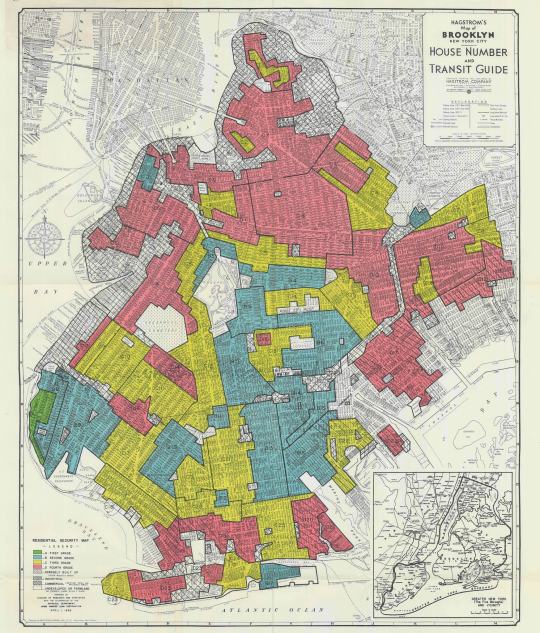
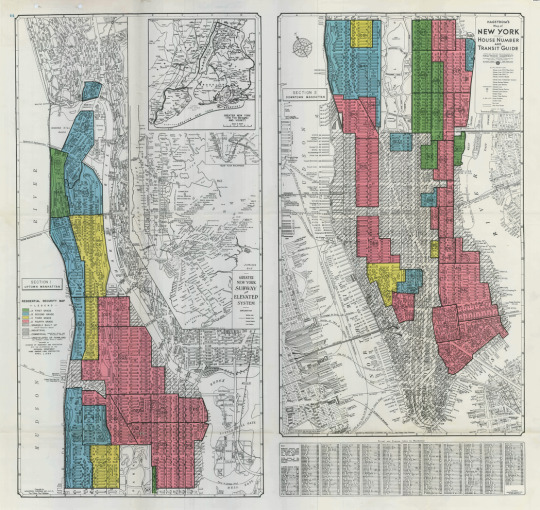
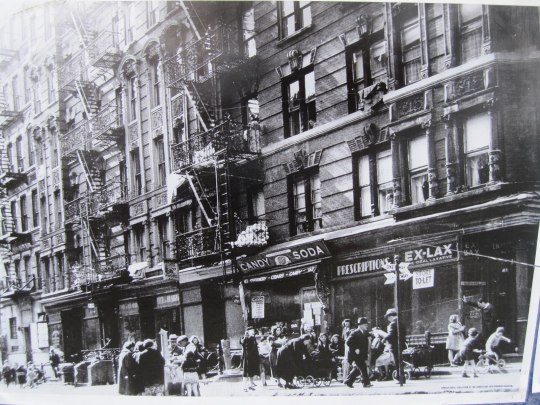
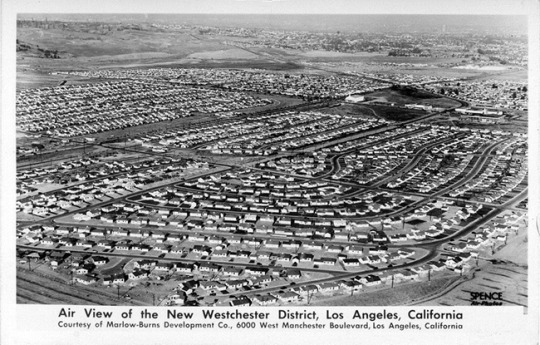
Redlining in America
Part 1: The Origin of Redlining
Redlining is the practice of rating neighbourhoods for their value and perceived risk when issuing mortgages. What made it so destructive, both at the time and for generations to come, was the heavy racial element involved in these assessments and its promotion of segregated living, schools and many other facets of people’s lives.
Origins
While the term ‘redlining’ wasn’t coined until the 1960s, the practice began in the 1930s. The early 1930s saw a housing crisis, with families already in homes defaulting on their mortgage repayments due to the financial crisis, and a stall in the construction industry as the number of new home constructions dropped off alongside a drop in new homeownership.
In 1933, the federal government launched the Home Owners’ Loan Corporation (HOLC), which purchased existing mortgages in imminent foreclosure, and then reissued them with longer repayment schedules (up to 15-20 years, as opposed to their previous 3-5 years). They were also at lower interest rates and became fully amortized, meaning for the first time working- and middle-class homeowners would gradually gain equity during the mortgage and eventually own the property in full. The HOLC created their own colour-coded maps with which they (in large party) decided the risk of a neighbourhood. These maps were made for every metropolitan area across the country.
The government also tried to encourage middle-class families to buy single-family homes, and in 1934, as part of the New Deal, the Roosevelt administration created the Federal Housing Administration (FHA). The purpose of the FHA was to insure bank mortgages, extend their terms up to 20 years, and make them fully amortized.
To qualify for both the HOLC mortgage buy-out and the insurance from the FHA, the property in question would be evaluated for risk to assess the risk of the loan. HOLC used their colour-coded maps, and the FHA used agents working from their Underwriting Manual, which included detailed direction for assessment. If the assessment judged the property too high-risk the HOLC would not rescue the mortgage and it would go into foreclosure, and the FHA insurance would be rejected, and the property deemed “unfit for investment” by the bank, resulting in that potential homeowner being unable to purchase.
Continue Reading...
This is just the bare-bones basics of redlining and its origins, the next post in the series will go into the assessment process and destructive results of it.
Redlining in America - Part 2: Assessment
Redlining in America - Part 3: Discrimination and Damage
Useful Resources
BOOK Rothstein, R. (2018) The Color of Law: A Forgotten History of How Our Government Segregated America. New York: Liveright Publishing Corporation.
— This was probably the single most useful book I used during research.
My Research Notes
Image Sources
HOLC Map of Brooklyn, 1938 | Source
HOLC Map of Manhattan, 1938 | Source
Lower East Side, c.1930s | Source
Winchester, CA suburban development, c.1930s | Source

This post has been sponsored by my much loved and long-time Patreon supporter Joanna Daniels. She and I would like to dedicate the post to the loving memory of her mother Joan Daniels. She will be sorely missed.

[ Support SRNY through Patreon and Ko-Fi ] And join us on Discord for fun conversation! I also have an Etsy with upcycled nerdy crafts
#Steve Rogers#Redlining#american history#Black History#New York#Structural Racism#Structural Violence#1930s#early 20th century#History#historically accurate#historic new york#Captain America#Bucky Barnes#Captain America: The First Avenger#captain america tfa#CAPTAIN AMERICA REFERENCE#fanfiction#fanfic writing#Fanfic references#fanfic research#writing#writing resources#fan fic writing#writing reference#urban history
17 notes
·
View notes
Text
I Have a Dream - Martin Luther King, Jr.
Martin Luther King, Jr.
I Have a Dream
delivered 28 August 1963, at the Lincoln Memorial, Washington D.C.
I am happy to join with you today in what will go down in history as the greatest demonstration for freedom in the history of our nation.
Five score years ago, a great American, in whose symbolic shadow we stand today, signed the Emancipation Proclamation. This momentous decree came as a great beacon light of hope to millions of Negro slaves who had been seared in the flames of withering injustice. It came as a joyous daybreak to end the long night of their captivity.
But one hundred years later, the Negro still is not free. One hundred years later, the life of the Negro is still sadly crippled by the manacles of segregation and the chains of discrimination. One hundred years later, the Negro lives on a lonely island of poverty in the midst of a vast ocean of material prosperity. One hundred years later, the Negro is still languished in the corners of American society and finds himself an exile in his own land. And so we've come here today to dramatize a shameful condition.
In a sense we've come to our nation's capital to cash a check. When the architects of our republic wrote the magnificent words of the Constitution and the Declaration of Independence, they were signing a promissory note to which every American was to fall heir. This note was a promise that all men, yes, black men as well as white men, would be guaranteed the "unalienable Rights" of "Life, Liberty and the pursuit of Happiness." It is obvious today that America has defaulted on this promissory note, insofar as her citizens of color are concerned. Instead of honoring this sacred obligation, America has given the Negro people a bad check, a check which has come back marked "insufficient funds."
But we refuse to believe that the bank of justice is bankrupt. We refuse to believe that there are insufficient funds in the great vaults of opportunity of this nation. And so, we've come to cash this check, a check that will give us upon demand the riches of freedom and the security of justice.
We have also come to this hallowed spot to remind America of the fierce urgency of Now. This is no time to engage in the luxury of cooling off or to take the tranquilizing drug of gradualism. Now is the time to make real the promises of democracy. Now is the time to rise from the dark and desolate valley of segregation to the sunlit path of racial justice. Now is the time to lift our nation from the quicksands of racial injustice to the solid rock of brotherhood. Now is the time to make justice a reality for all of God's children.
It would be fatal for the nation to overlook the urgency of the moment. This sweltering summer of the Negro's legitimate discontent will not pass until there is an invigorating autumn of freedom and equality. Nineteen sixty-three is not an end, but a beginning. And those who hope that the Negro needed to blow off steam and will now be content will have a rude awakening if the nation returns to business as usual. And there will be neither rest nor tranquility in America until the Negro is granted his citizenship rights. The whirlwinds of revolt will continue to shake the foundations of our nation until the bright day of justice emerges.
But there is something that I must say to my people, who stand on the warm threshold which leads into the palace of justice: In the process of gaining our rightful place, we must not be guilty of wrongful deeds. Let us not seek to satisfy our thirst for freedom by drinking from the cup of bitterness and hatred. We must forever conduct our struggle on the high plane of dignity and discipline. We must not allow our creative protest to degenerate into physical violence. Again and again, we must rise to the majestic heights of meeting physical force with soul force.
The marvelous new militancy which has engulfed the Negro community must not lead us to a distrust of all white people, for many of our white brothers, as evidenced by their presence here today, have come to realize that their destiny is tied up with our destiny. And they have come to realize that their freedom is inextricably bound to our freedom.
We cannot walk alone.
And as we walk, we must make the pledge that we shall always march ahead.
We cannot turn back.
There are those who are asking the devotees of civil rights, "When will you be satisfied?" We can never be satisfied as long as the Negro is the victim of the unspeakable horrors of police brutality. We can never be satisfied as long as our bodies, heavy with the fatigue of travel, cannot gain lodging in the motels of the highways and the hotels of the cities. **We cannot be satisfied as long as the negro's basic mobility is from a smaller ghetto to a larger one. We can never be satisfied as long as our children are stripped of their self-hood and robbed of their dignity by signs stating: "For Whites Only."** We cannot be satisfied as long as a Negro in Mississippi cannot vote and a Negro in New York believes he has nothing for which to vote. No, no, we are not satisfied, and we will not be satisfied until "justice rolls down like waters, and righteousness like a mighty stream."
I am not unmindful that some of you have come here out of great trials and tribulations. Some of you have come fresh from narrow jail cells. And some of you have come from areas where your quest -- quest for freedom left you battered by the storms of persecution and staggered by the winds of police brutality. You have been the veterans of creative suffering. Continue to work with the faith that unearned suffering is redemptive. Go back to Mississippi, go back to Alabama, go back to South Carolina, go back to Georgia, go back to Louisiana, go back to the slums and ghettos of our northern cities, knowing that somehow this situation can and will be changed.
Let us not wallow in the valley of despair, I say to you today, my friends.
And so even though we face the difficulties of today and tomorrow, I still have a dream. It is a dream deeply rooted in the American dream.
I have a dream that one day this nation will rise up and live out the true meaning of its creed: "We hold these truths to be self-evident, that all men are created equal."
I have a dream that one day on the red hills of Georgia, the sons of former slaves and the sons of former slave owners will be able to sit down together at the table of brotherhood.
I have a dream that one day even the state of Mississippi, a state sweltering with the heat of injustice, sweltering with the heat of oppression, will be transformed into an oasis of freedom and justice.
I have a dream that my four little children will one day live in a nation where they will not be judged by the color of their skin but by the content of their character.
I have a dream today!
I have a dream that one day, down in Alabama, with its vicious racists, with its governor having his lips dripping with the words of "interposition" and "nullification" -- one day right there in Alabama little black boys and black girls will be able to join hands with little white boys and white girls as sisters and brothers.
I have a dream today!
I have a dream that one day every valley shall be exalted, and every hill and mountain shall be made low, the rough places will be made plain, and the crooked places will be made straight; "and the glory of the Lord shall be revealed and all flesh shall see it together."
This is our hope, and this is the faith that I go back to the South with.
With this faith, we will be able to hew out of the mountain of despair a stone of hope. With this faith, we will be able to transform the jangling discords of our nation into a beautiful symphony of brotherhood. With this faith, we will be able to work together, to pray together, to struggle together, to go to jail together, to stand up for freedom together, knowing that we will be free one day.
And this will be the day -- this will be the day when all of God's children will be able to sing with new meaning:
My country 'tis of thee, sweet land of liberty, of thee I sing. Land where my fathers died, land of the Pilgrim's pride, From every mountainside, let freedom ring!
And if America is to be a great nation, this must become true.
And so let freedom ring from the prodigious hilltops of New Hampshire.
Let freedom ring from the mighty mountains of New York.
Let freedom ring from the heightening Alleghenies of Pennsylvania.
Let freedom ring from the snow-capped Rockies of Colorado.
Let freedom ring from the curvaceous slopes of California.
But not only that:
Let freedom ring from Stone Mountain of Georgia.
Let freedom ring from Lookout Mountain of Tennessee.
Let freedom ring from every hill and molehill of Mississippi.
From every mountainside, let freedom ring.
And when this happens, and when we allow freedom ring, when we let it ring from every village and every hamlet, from every state and every city, we will be able to speed up that day when all of God's children, black men and white men, Jews and Gentiles, Protestants and Catholics, will be able to join hands and sing in the words of the old Negro spiritual:
Free at last! Free at last!
Thank God Almighty, we are free at last!
3 notes
·
View notes
Text
Okay but. DT/ATLA AU.
As written in Discord by myself, @jettreno, @azkre, and moon-owo-star
Huey: Earthbender
Dewey: Airbender
Louie: Waterbender
Webby: Firebender
Beakley: Firebender
Della: Firebender
Launchpad: Airbender
Violet: Non-Bender/Chi Blocking
Scrooge: Non-Bender/Emperor
Donald: Non-Bender
Drake: Non-Bender/Experienced hand-to-hand
Goldie: Non-Bender/Thief
Some time after the LoK era, the nations have integrated more, leaving less segregated areas for one type of bender/nation. The last avatar died fourteen years ago, and no one’s found the new one - there’s even a rumor that the Avatar spirit finally passed on, as there was no need for one anymore. The world is at peace.
Sooooooooooooorta.
Brewing in the lower parts of society is a group that calls itself the Traditionalists - a sort of sister group to the Equalists, except they just want the four nations separated again, with each type of bender staying in one area instead of all types living and having families together. Among them is Magica de Spell, a non-bender with some mystical powers (she’s a witch), who’s been concocting a plan for years that she won’t tell anyone else about, just that it involves her odd, elusive niece (Lena). Lena’s been kept locked up for years, almost never leaving the house, because Magica can’t have her getting hurt, or finding out how special she really is. So can she really be blamed when she takes her first chance at freedom and runs away?
#DT AU#See this is what you're missing out on if you don't join the weblena server#I'm just saying#AvatarTales
106 notes
·
View notes
Text
"I HAVE A DREAM ..."
(Copyright 1963, MARTIN LUTHER KING, JR.)
Speooh by the Rev. MARTIN LUTHER KING At the "March on Washington"
August 28 1963
I am happy to join with you today in what will go down in history as the greatest demonstration for freedom in the history of our nation.
Five score years ago, a great American, in whose symbolic shadow we stand today, signed the Emancipation Proclamation. This momentous decree came as a great beacon light of hope to millions of Negro slaves who had been seared in the flames of withering injustice. It came as a joyous daybreak to end the long night of captivity.
But one hundred years later, the Negro still is not free. One hundred years later, the life of the Negro is still sadly crippled by the manacles of segregation and the chains of discrimination. One hundred years later, the Negro lives on a lonely island of poverty in the midst of a vast ocean of material prosperity. One hundred years later, the Negro is still languished in the corners of American society and finds himself in exile in his own land. So we have come here today to dramatize an shameful condition.
In a sense we've come to our nation's Capital to cash a check. When the architects of our republic wrote the magnificent words of the Constitution and the Declaration of Independence, they were signing a promissory note to which every American was to fall heir.
This note was a promise that all men, yes, black men as well as white men, would be guaranteed the unalienable rights of life, liberty, and the pursuit of happiness.
It is obvious today that America has defaulted on this promissory note insofar as her citizens of color are concerned. Instead of honoring this sacred obligation, America has given the Negro people a bad check; a check which has come back marked "insufficient funds."
But we refuse to believe that the bank of justice is bankrupt. We refuse to believe that there are insufficient funds in the great vaults of opportunity of this nation. So we have come to cash this check- a check that will give us upon demand the riches of freedom and the security of justice.
We have also come to this hallowed spot to remind America of the fierce urgency of now. This is no time to engage in the luxury of cooling off or to take the tranquilizing drug of gradualism.
Now is the time to make real the promises of democracy. Now is the time to rise from the dark and desolate valley of segregation to the sunlit path of racial justice. Now is the time to lift our nation from the quicksands of racial injustice to the solid rock of brotherhood. Now is the time to make justice a reality for all of God's children.
It would be fatal for the nation to overlook the urgency of the moment. This sweltering summer of the Negro's legitimate discontent will not pass until there is an invigorating autumn of freedom and equality. Nineteen sixty-three is not an end, but a beginning. Those who hope that the Negro needed to blow off steam and will now be content will have a rude awakening if the nation returns to business as usual. There will be neither rest nor tranquility in America until the Negro is granted his citizenship rights. The whirlwinds of revolt will continue to shake the foundations of our nation until the bright day of justice emerges.
But there is something that I must say to my people who stand on the warm threshold which leads into the palace of justice. In the process of gaining our rightful place we must not be guilty of wrongful deeds. Let us not seek to satisfy our thirst for freedom by drinking from the cup of bitterness and hatred. We must forever conduct our struggle on the high plane of dignity and discipline. We must not allow our creative protest to degenerate into physical violence. Again and again we must rise to the majestic heights of meeting physical force with soul force.
The marvelous new militancy which has engulfed the Negro community must not lead us to a distrust of all white people, for many of our white brothers, as evidenced by their presence here today, have come to realize that their destiny is tied up with our destiny. And they have come to realize that their freedom is inextricably bound to our freedom. We cannot walk alone.
And as we walk, we must make the pledge that we shall march ahead. We cannot turn back. There are those who are asking the devotees of civil rights, "When will you be satisfied?"
We can never be satisfied as long as the Negro is the victim of the unspeakable horrors of police brutality.
We can never be satisfied as long as our bodies, heavy with the fatigue of travel, cannot gain lodging in the motels of the highways and the hotels of the cities.
We cannot be satisfied as long as the Negro's basic mobility is from a smaller ghetto to a larger one.
We can never be satisfied as long as our chlidren are stripped of their selfhood and robbed of their dignity by signs stating "for whites only."
We cannot be satisfied as long as a Negro in Mississippi cannot vote and a Negro in New York believes he has nothing for which to vote.
No, no, we are not satisfied, and we will not be satisfied until justice rolls down like waters and righteousness like a mighty stream.
I am not unmindful that some of you have come here out of great trials and tribulations. Some of you have come fresh from narrow jail cells. Some of you have come from areas where your quest for freedom left you battered by the storms of persecution and staggered by the winds of police brutality. You have been the veterans of creative suffering. Continue to work with the faith that unearned suffering is redemptive.
Go back to Mississippi, go back to Alabama, go back to South Carolina, go back to Georgia, go back to Louisiana, go back to the slums and ghettos of our northern cities, knowing that somehow this situation can and will be changed. Let us not wallow in the valley of despair.
I say to you today, my friends, so even though we face the difficulties of today and tomorrow, I still have a dream. It is a dream deeply rooted in the American dream.
I have a dream that one day this nation will rise up and live out the true meaning of its creed: "We hold these truths to be self-evident; that all men are created equal."
I have a dream that one day on the red hills of Georgia the sons of former slaves and the sons of former slave owners will be able to sit down together at the table of brotherhood.
I have a dream that one day even the state of Mississippi, a state sweltering with the heat of injustice, sweltering with the heat of oppression, will be transformed into an oasis of freedom and justice.
I have a dream that my four little children will one day live in a nation where they will not be judged by the color of their skin but by the content of their character.
I have a dream today.
I have a dream that one day down in Alabama, with its vicious racists, with its governor having his lips dripping with the words of interposition and nullification, that one day right down in Alabama little black boys and black girls will be able to join hands with little white boys and white girls as sisters and brothers.
I have a dream today.
I have a dream that one day every valley shall be exhalted, every hill and mountain shall be made low, the rough places will be made plain, and the crooked places will be made straight, and the glory of the Lord shall be revealed, and all flesh shall see it together.
This is our hope. This is the faith that I will go back to the South with. With this faith we will be able to hew out of the mountain of despair a stone of hope. With this faith we will be able to transform the jangling discords of our nation into a beautiful symphony of brotherhood.
With this faith we will be able to work together, to pray together, to struggle together, to go to jail together, to stand up for freedom together, knowing that we will be free one day.
This will be the day when all of God's children will be able to sing with new meaning, "My country 'tis of thee, sweet land of liberty, of thee I sing. Land where my fathers died, land of the Pilgrims' pride, from every mountainside, let freedom ring."
And if America is to be a great nation, this must become true. So let freedom ring from the prodigious hilltops of New Hampshire. Let freedom ring from the mighty mountains of New York. Let freedom ring from the heightening Alleghenies of Pennsylvania.
Let freedom ring from the snow-capped Rockies of Colorado. Let freedom ring from the curvaceous slopes of California. But not only that; let freedom ring from the Stone Mountain of Georgia. Let freedom ring from Lookout Mountain of Tennessee.
Let freedom ring from every hill and molehill of Mississippi. From every mountainside, let freedom ring.
And when this happens, and when we allow freedom ring, when we let it ring from every village and every hamlet, from every state and every city, we will be able to speed up that day when all of God's children, black men and white men, Jews and gentiles, Protestants and Catholics, will be able to join hands and sing in the words of the old Negro spiritual, "Free at last! Free at last! Thank God Almighty, we are free at last!"
36 notes
·
View notes